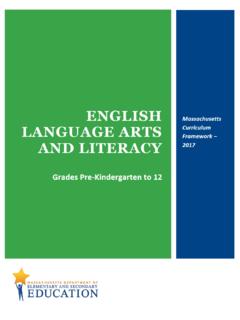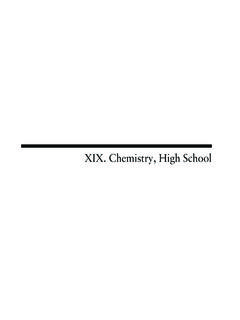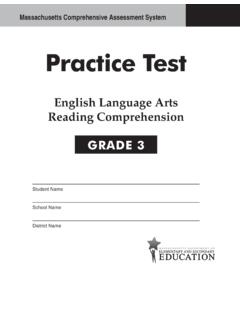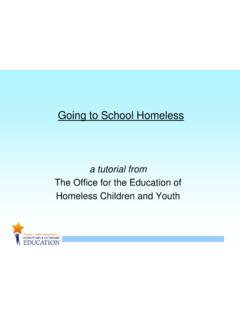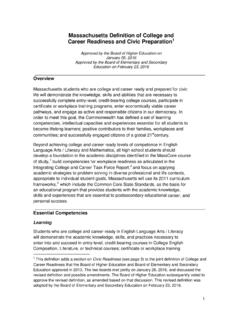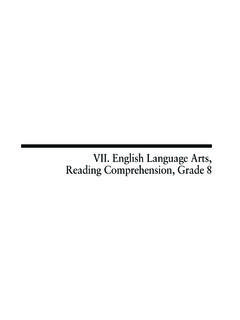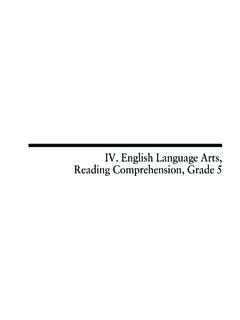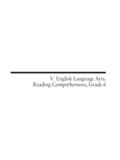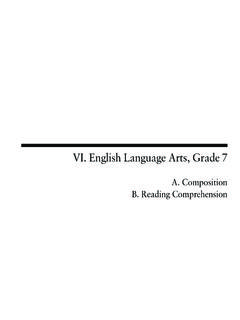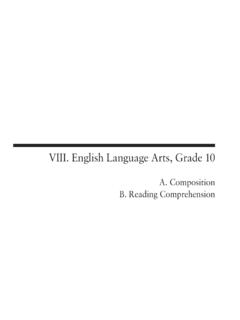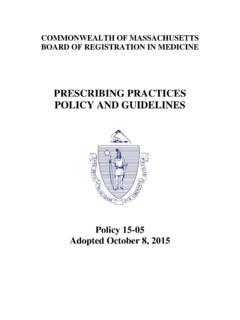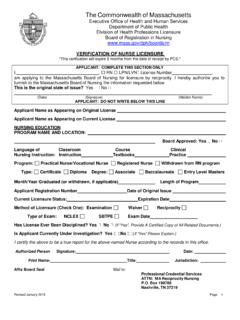Transcription of Subject Matter Knowledge (SMK) Guidelines - doe.mass.edu
1 Subject Matter Knowledge (SMK) Guidelines Updated September 2019. massachusetts Department of Elementary and Secondary Education 75 Pleasant Street, Malden, MA 02148-4906. Phone 781-338-3000 TTY: Relay 800-439-2370. Subject Matter Knowledge (SMK) Guidelines Table of Contents Table of Contents ..1. Purpose ..3. Context ..3. Change in Approach .. 3. Content Knowledge as One Piece of Effective Practice .. 5. Orientation to Overall Approach ..6. Subject Matter Knowledge (SMK) Requirements ..7. Teacher Licenses and Levels, 603 CMR .. 7. Crosscutting 7. Science, Technology, and Engineering .. 9. Mathematics .. 10. Mathematics/Science .. 10. Digital Literacy and Computer Science.
2 10. English Language Arts (ELA) and Literacy .. 12. English Language Arts (ELA) and Literacy and History .. 12. History and Social Science .. 12. Early Childhood .. 13. Elementary .. 13. Moderate and Severe Disabilities .. 13. Teacher of Students with Severe Disabilities, All .. 14. Arts .. 16. Foreign and Classical Language .. 17. Latin and Classical Humanities, 5-12 .. 21. Health and Physical Education .. 22. Teacher of the Deaf and Hard of Hearing and Visually 23. 25. English as a Second Language .. 25. Library .. 26. Specialist Teacher Licenses and Levels, 603 CMR .. 27. Instructional Technology Specialist, All .. 27. Reading, 28. Speech, Language, and Hearing Disorders, All.
3 29. Administrator Licenses and Levels, 603 CMR : .. 30. Subject Matter Knowledge (SMK) Guidelines Superintendent/Assistant Superintendent, All .. 30. School Principal/Assistant School Principal, Pre-K 8; 5-12 .. 30. Supervisor/Director, Dependent on Prerequisite License .. 30. Special Education Administrator, All .. 30. School Business Administrator, All .. 30. Professional Support Personnel Licenses and Levels, 603 CMR .. 31. School Counselor, Pre-K 8; 5-12 .. 31. School Nurse, All .. 31. School Psychologist, All .. 31. School Social Worker/School Adjustment Counselor, All .. 31. Appendix A Required Subject Matter Assessment for Licensure ..32. Subject Matter Knowledge (SMK) Guidelines Purpose Students in massachusetts must meet rigorous academic standards, which are outlined in the massachusetts Curriculum Frameworks.
4 To do so, they must have access to educators with strong content Knowledge and pedagogical skill, the building blocks of effective instructional practice. In support of promoting strong content Knowledge , these Subject Matter Knowledge (SMK) Guidelines set forth the content Knowledge expectations for educator licensure in massachusetts . These Guidelines serve two primary purposes: 1. Sponsoring Organizations (SOs) use the SMKs in designing educator preparation programs and in preparing candidates. 2. The massachusetts Department of Elementary and Secondary Education (DESE) uses the SMKs in decisions about educator licensure and program approval, including: authorizing a SO to operate, reviewing individual licensure applications and licensure renewal, and developing the massachusetts Tests for Educator Licensure (MTELs).
5 Through these mechanisms, DESE seeks to ensure that educators entering the workforce have sufficient content Knowledge in their licensure area to support students in mastering relevant massachusetts Curriculum Frameworks. With the goal of focusing all efforts first on the needs of our students in massachusetts , the SMK. requirements outlined here directly align with the set of pre-K 12 massachusetts Curriculum Frameworks appropriate for the Subject and grade level license, wherever possible. For more detailed information about implications associated with these Guidelines , please refer to the SMK Implementation Memo released as a companion to this document.
6 Context Change in Approach DESE is making a shift in the way the state has historically approached articulating content expectations for educators. Most notably, for licensure areas in which a massachusetts Curriculum Framework exists, these Guidelines directly reference the Framework to establish that educators need to demonstrate a certain level of depth and fluency in the content Knowledge needed to teach the Frameworks, rather than provide a separate, additional set of content expectations. The Frameworks for students now anchor the expectations of content Knowledge for educators. While they serve as an anchor, the intent and expectation is not that educators should simply know the content included in the Frameworks.
7 Rather, educators must move beyond a basic or functional Knowledge of the Frameworks to a level of fluency or expertise with the academic standards such that they can teach and support students in mastering the content. The figure below shows a steady progression, not in the amount of information one knows about, but in the depth and ability to use that information for a specific purpose. Page | 3. Subject Matter Knowledge (SMK) Guidelines The boxes below the continuum illustrate the practical applications of the difference in depth and fluency of expectations of the content Knowledge as it relates to the massachusetts licensure system and suite of required assessments used to determine varying levels of content Knowledge .
8 The depth at which the Knowledge and application of the SMKs must be demonstrated is dependent on the stage of development for an individual educator ( Basic, Functional, Fluent, or Expert) and/or licensure (Provisional, Initial, or Temporary). Alignment of Expectations: This approach more tightly aligns expectations for individuals preparing to be educators with those in place for educators once they are employed. By grounding all preparation and licensure expectations in the massachusetts Curriculum Frameworks, educators will be more explicitly prepared to teach to those standards effectively with students. Furthermore, this approach streamlines implementation timelines in educator preparation around the adoption of new Frameworks, such that programs can immediately begin to align coursework with newly adopted Frameworks.
9 Additionally, this alignment will open up a larger set of resources and opportunities to preparation programs and their candidates given the work already in place to support Pre-K 12. standards implementation. Structured Flexibility for SOs: The approach creates flexibility and autonomy for preparation providers in designing a set of coherent experiences for novice educators rooted in the needs of massachusetts ' Pre-K 12 students. It also empowers SOs to make decisions based on professional expertise and the needs of the candidates with whom they are working. This aligns with an overall effort to be descriptive of expectations without being prescriptive of approach.
10 Finally, it will provide additional incentives and opportunities to support candidates to develop instructional practices that connect their developing pedagogical skills to the content their students must learn. Page | 4. Subject Matter Knowledge (SMK) Guidelines This approach means that SOs will need to operate differently moving forward. SOs will continue to be responsible for ensuring that candidates have the necessary content Knowledge to be effective in the licensure role. Now, SOs will also need to engage in a more intentional planning effort within each program to unpack the massachusetts Curriculum Frameworks and identify the necessary depth and breadth of content Knowledge candidates will need to support all students in mastering the academic standards.
